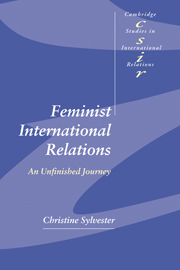Book contents
- Frontmatter
- Contents
- Acknowledgments
- Part I Introduction
- Part II Sightings
- 3 Handmaids' tales of Washington power: the abject and the real Kennedy White House
- 4 Reginas in international relations: occlusions, cooperations, and Zimbabwean cooperatives
- 5 The White Paper trailing
- 6 Picturing the Cold War: an eye graft/art graft
- 7 Four international Dianas: Andy's tribute
- Part III Sitings
- Part IV Citings
- References
- Index
- CAMBRIDGE STUDIES IN INTERNATIONAL RELATIONS
4 - Reginas in international relations: occlusions, cooperations, and Zimbabwean cooperatives
Published online by Cambridge University Press: 22 September 2009
- Frontmatter
- Contents
- Acknowledgments
- Part I Introduction
- Part II Sightings
- 3 Handmaids' tales of Washington power: the abject and the real Kennedy White House
- 4 Reginas in international relations: occlusions, cooperations, and Zimbabwean cooperatives
- 5 The White Paper trailing
- 6 Picturing the Cold War: an eye graft/art graft
- 7 Four international Dianas: Andy's tribute
- Part III Sitings
- Part IV Citings
- References
- Index
- CAMBRIDGE STUDIES IN INTERNATIONAL RELATIONS
Summary
This set of sightings moves geospatially and geopolitically from a Washington powerhouse to the fields and workshops of women in Zimbabwe, a country and a people that have not figured into IR's line-up of power worthies. I am fascinated with labor that (only) seems to take place in power-insignificant or-irrelevant locations of international relations, and with workers who are women. “Reginas,” an earlier piece than “Handmaids’ Tales,” brings those interests to IR via hidden, distant, and “minor” cooperatives of Zimbabwean women, which I link to a feminist update of regime analysis.
The study grows out of twenty years of regular field research in Zimbabwe coupled with the type of regional travel that puts one into parallel orbit with the always already world-traveling Cynthia Enloe. Then again, that Zimbabwean women could teach IR a lesson or two on cooperation joins my work with Tickner's efforts to nudge IR into seeing what is has been missing of the world. I am also keenly aware of Elshtain's Women and War whenever I contemplate the contributions women made to Zimbabwe's ten-year war for independence, and the ways in which a conflagration that ended in 1979 still affects local understandings of “women.”
I first journeyed to Zimbabwe in 1982 as a refugee from the power-centered world of IR. Plumping out my second area of Ph.D. concentration, African politics, I arrived looking for the fabled Marxism of the new Zimbabwe.
- Type
- Chapter
- Information
- Feminist International RelationsAn Unfinished Journey, pp. 85 - 105Publisher: Cambridge University PressPrint publication year: 2001



